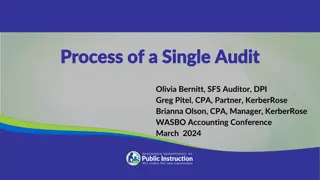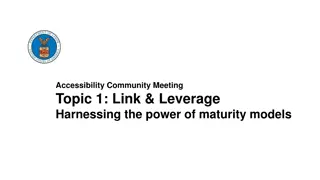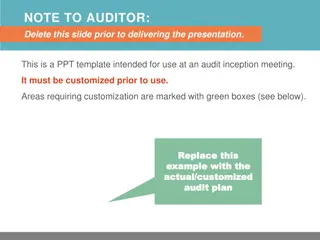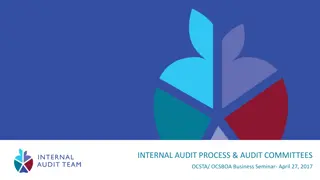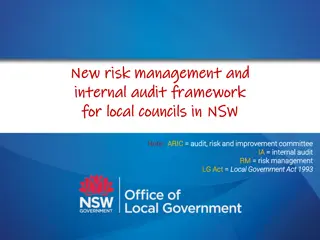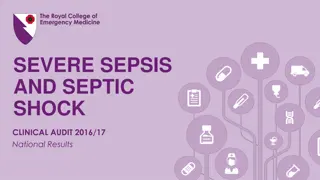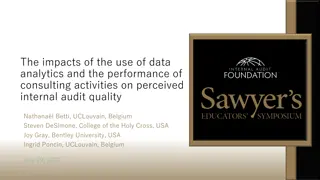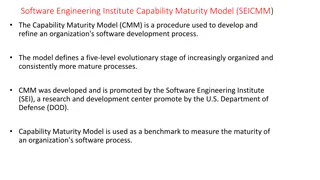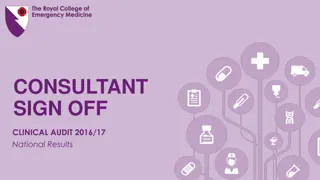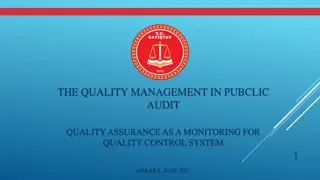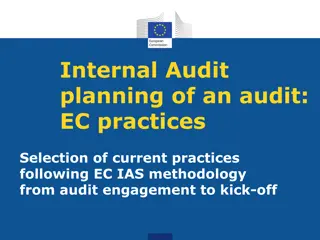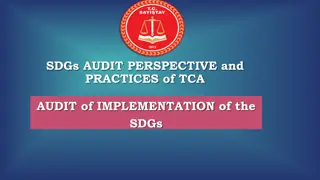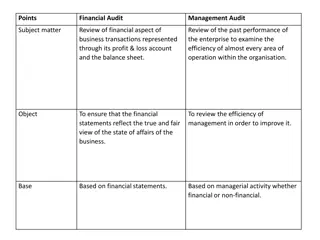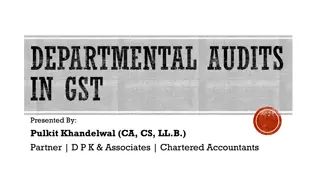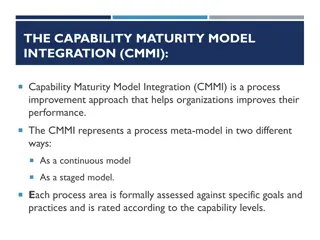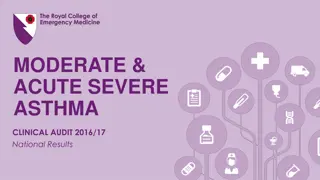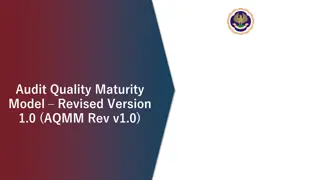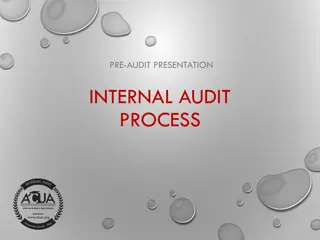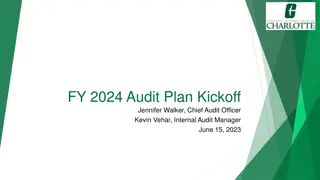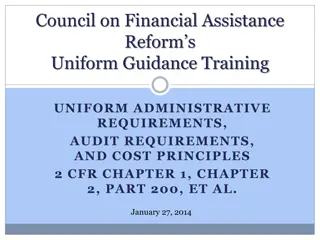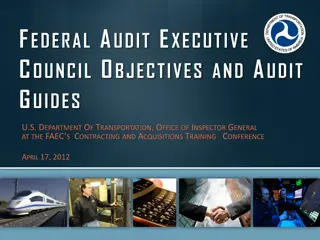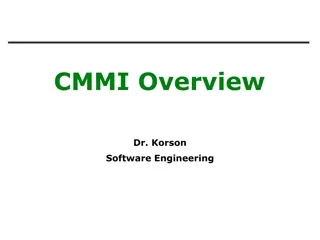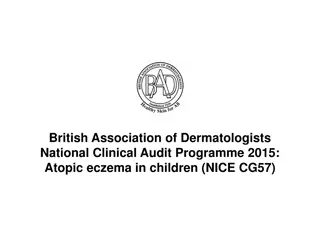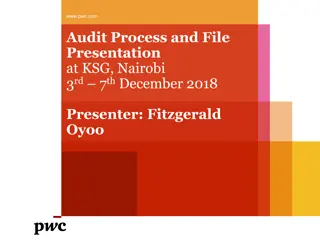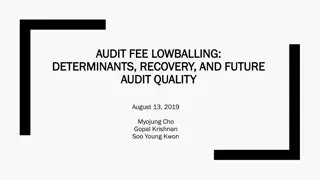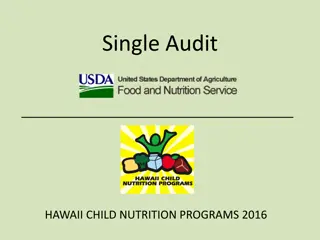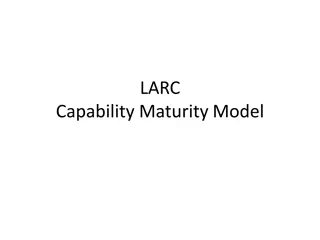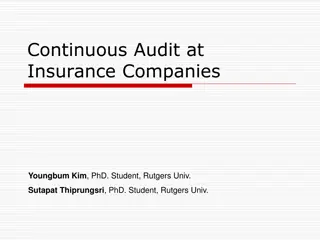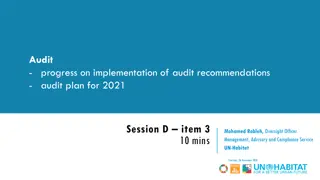Compliance with Audit Documentation
Understand the significance of audit documentation in proving compliance with audit requirements, ensuring quality audit work, and providing evidence for audit conclusions. Learn about the purpose, requirements, and definitions of audit documentation as outlined in auditing standards. Proper documen
6 views • 40 slides
Digital Competency Maturity Model 2.0 for Accounting Firms - Overview and Implementation
The Digital Competency Maturity Model 2.0 (DCMM 2.0) is a framework designed to help professional accounting firms evaluate and enhance their digital competencies. Released as an upgrade to the previous version in 2017, DCMM 2.0 offers a structured approach for firms to assess their current level of
4 views • 19 slides
Understanding the Single Audit Process for Federal Grants
The single audit process is a requirement for non-federal entities receiving over $750,000 in Federal awards, ensuring compliance with program requirements and Uniform Guidance. This audit involves examining financial statements and ensuring proper fund utilization. Auditee responsibilities and key
0 views • 36 slides
Leveraging Maturity Models in Accessibility Community Meetings
Explore the importance of maturity models in assessing effectiveness and capabilities for improvement in the realm of accessibility. Delve into topics like defining success, standing up a 508 Office, and understanding OMB 508 Maturity Model. Discover how maturity models can enhance understanding and
0 views • 36 slides
Audit of Ward-based IT Infrastructure at University Hospital of Limerick
In response to a cyber-attack on the HSE in 2021, an audit was conducted at University Hospital of Limerick to assess the accessibility of key healthcare-related computer programs. The audit revealed issues such as JavaScript errors, missing plug-ins, outdated software, and internet access issues. I
0 views • 4 slides
Understanding the WSP Audit Process
Explore the key elements of a WSP audit, including roles and responsibilities, audit types, objectives, and scoring criteria. Learn how WSP audits offer learning opportunities and drive continuous improvement in organizational quality. Get insights on how to assess WSP completeness and effectiveness
4 views • 13 slides
Understanding Maturity Indices of Fruits and Vegetables
Maturity in fruits and vegetables is crucial for proper ripening, storage, and transportation. Picking produce at the right stage impacts flavor, quality, and shelf life. Harvesting too early or too late can result in issues like flavor loss, faster deterioration, and lower yields. Learn about the i
1 views • 24 slides
Internal Audit Process & Audit Committees Overview
Explore the functions and responsibilities of internal audit processes and audit committees in the context of school boards in Ontario. Covering topics such as governance, risk management, compliance, and internal controls, the content delves into the structure, mandate, and activities of internal a
2 views • 34 slides
New Risk Management and Internal Audit Framework for Local Councils in NSW
This framework outlines the importance of audit, risk, and improvement committees (ARIC), internal audit (IA), and risk management (RM) in local councils in NSW under the Local Government Act 1993. It defines key terms, such as Audit Committee, Internal Audit, Risk Management, and the three lines of
1 views • 31 slides
National Audit Results for Severe Sepsis and Septic Shock 2016/17
This presentation outlines the national results of a clinical audit conducted in 2016/17 regarding the management of severe sepsis and septic shock in Emergency Departments (EDs). The audit objectives include benchmarking current performance, facilitating national and peer comparisons, identifying a
0 views • 25 slides
Impact of Data Analytics and Consulting Activities on Internal Audit Quality
This research examines how the use of data analytics and consulting activities affect perceived internal audit quality. The study investigates the relationship between these factors and top management's perception of internal audit quality. Through online scenario-based experiments with middle and t
2 views • 11 slides
Understanding SEICMM - Software Engineering Institute Capability Maturity Model
The SEICMM, also known as the Capability Maturity Model (CMM), is a framework developed by the Software Engineering Institute (SEI) to enhance an organization's software development process. It consists of five maturity levels to assess and improve processes, from initial ad hoc activities to optimi
0 views • 6 slides
National Clinical Audit 2016/17: Consultant Sign-Off Summary
This presentation displays the national results of the 2016/17 clinical audit, focusing on the performance of Emergency Departments (EDs) against audit standards. The audit objectives include benchmarking current performance, allowing national and peer comparisons, identifying areas for improvement,
2 views • 45 slides
Understanding Quality Assurance in Public Audit Systems
Quality assurance in public audit systems plays a crucial role in evaluating audit compliance, improving quality control processes, and detecting problem areas. It helps ensure effective operation and establishment of quality controls, supporting audit findings with proper evidence, disseminating go
1 views • 22 slides
Internal Audit Planning and Practices for Effective Risk Management
Planning an internal audit following EC practices is crucial for enhancing and protecting organizational value. The Internal Audit Service's mission focuses on providing risk-based assurance and advice to improve risk management, control, and governance processes. From audit engagement to kick-off,
0 views • 17 slides
Weatherization Energy Auditor Single Family - Energy Audit Software
This content discusses the standard curriculum for the Weatherization Assistance Program focusing on energy audit software for single-family homes. It covers learning objectives, terminology, energy audits, federal rules, and guidance related to energy audit approval procedures. Participants will le
0 views • 14 slides
Audit Practices for SDGs Implementation Evaluation in Turkey
This content delves into the process of auditing the implementation of Sustainable Development Goals (SDGs) in Turkey, focusing on renewable energy policies. It covers topics such as audit perspective, selecting audit topics, the link between national targets and SDGs, planning stages, defining audi
1 views • 22 slides
Comparison of Financial Audit and Management Audit
Financial audit focuses on reviewing financial statements for accuracy and compliance, while management audit assesses the efficiency of operations and future planning. Financial audit is a legal requirement for registered companies, conducted by chartered accountants, and emphasizes error detection
0 views • 17 slides
Stop, Think, and Be Mature: Understanding and Demonstrating Maturity in Personal Skills and Professionalism
Explore the concept of maturity in personal and professional settings through characteristics, importance, and ways to demonstrate it. Understand how maturity influences decision-making, creates a positive environment, and is essential in achieving goals. Learn to exhibit maturity in actions and int
0 views • 22 slides
Understanding Departmental Audits in GST
Departmental audits in GST involve the examination of records, returns, and other documents to verify the correctness of turnover declared, taxes paid, refunds claimed, and input tax credit availed. This audit ensures compliance with the provisions of the CGST Act, 2017. Types of audits under GST in
7 views • 27 slides
Understanding the Capability Maturity Model Integration (CMMI) for Process Improvement
Capability Maturity Model Integration (CMMI) is a framework that aids organizations in enhancing performance by assessing process maturity levels. It offers continuous and staged models for process improvement, with each level representing specific goals and practices. By following CMMI, organizatio
0 views • 14 slides
Clinical Audit Results of Moderate to Acute Severe Asthma in EDs 2016/17
This clinical audit presentation showcases the national results of how Emergency Departments (EDs) are performing against the established audit standards for moderate to acute severe asthma in the year 2016/17. The objectives of the audit were to benchmark current performance, enable national and pe
1 views • 36 slides
Audit Quality Maturity Model (AQMM) - Overview and Implementation Guidelines
The Audit Quality Maturity Model (AQMM) is a self-evaluation tool designed for audit firms to assess their level of maturity, identify strengths and weaknesses, and enhance their audit practices. The model covers various operational aspects such as revenue budgeting, technology adoption, and human r
1 views • 14 slides
Understanding Internal Audit and Controls Process
This content provides an overview of the pre-audit presentation, objectives of the presentation, the definition of internal audit, the role of internal audit in examining university departments, the university audit process, internal audit reporting lines, and insights on internal controls in an org
3 views • 30 slides
Internal Audit Department Overview
The Internal Audit Department at the University of North Carolina Charlotte is led by Chief Audit Officer Jennifer Walker and Internal Audit Manager Kevin Vehar. The team provides risk-based assurance, advisory services, and investigations to enhance organizational value. Their mission is to offer o
1 views • 17 slides
Conducting an Effective School Energy Audit
Performing an energy audit at a school helps in understanding energy usage patterns, identifying areas of waste, and creating energy-saving action plans. The audit involves collecting data, creating switch-off lists, and filling out templates methodically to track energy consumption. It should be do
0 views • 16 slides
Reforming Audit Requirements for Federal Awards
This presentation outlines the major policy changes in the government-wide requirements for auditing Federal awards under the Single Audit Act Amendments of 1996. It discusses the transition from OMB Circular A-133 to Subpart F-Audit Requirements in 2 CFR Part 200, focusing on targeting audit requir
1 views • 34 slides
Federal Audit Executive Council - Contract Closeout Guide Highlights
The Federal Audit Executive Council (FAEC) plays a vital role in coordinating issues affecting the Federal audit community, with a key emphasis on audit policy and operations. The FAEC's contracting committee has developed audit guides covering various topics like acquisition planning, market resear
1 views • 12 slides
Essential Tips for a Successful Audit Process
Learn key insights for effectively preparing and participating in an audit process, including understanding annual audit requirements, the importance of the initial steps, maximizing the audit process, and crucial steps for a successful audit. Gain a comprehensive overview to streamline your organiz
0 views • 17 slides
Understanding CMMI and Process Maturity in Software Engineering
This overview explores the concept of Capability Maturity Model Integration (CMMI) in software engineering. It discusses the difference between mature and immature organizations, highlighting the characteristics of each. The focus is on the importance of processes, quality, and continuous improvemen
0 views • 21 slides
Analysis of Atopic Eczema in Children: A National Clinical Audit Program
The British Association of Dermatologists conducted a national clinical audit program in 2015 to evaluate atopic eczema in children based on NICE guidelines. The audit included contributions from BAD and BSPD members, as well as private providers. It involved 128 submissions from 98 centers, with 12
2 views • 18 slides
Key Considerations for a Successful Audit Process in Nairobi
Understanding the importance of audit file preparation and key considerations for a successful audit process in Nairobi. Key staff participation, management of audit process, sharing draft financial statements for quality review, and following Act requirements are crucial steps for a successful audi
0 views • 23 slides
Auditing Lowballing: Impact on Audit Quality and Recovery
The study explores the practice of lowballing audit fees and its effects on auditor independence and audit quality. Key research questions examine the relationship between non-audit fees, client importance, and lowballing, as well as the recovery of initial fee discounts. Hypotheses suggest connecti
0 views • 12 slides
Understanding Spiritual Maturity in Christ
Delve into the concept of spiritual maturity defined as completeness and full age in Christian teachings. Explore the stages of maturity, the emphasis on goals, and the pursuit of maturity through fellowship with Christ. Reflect on the scriptural references that highlight the journey towards spiritu
0 views • 13 slides
Understanding Biomarkers and Maturity Parameters in Petroleum Exploration
Biomarkers and maturity parameters play crucial roles in characterizing source materials and assessing the thermal maturity of organic matter in petroleum exploration. Specific biomarkers and non-biomarker maturity parameters are utilized to determine the relative maturity of source rocks and oils.
0 views • 17 slides
Enhancing Process Maturity in SWIM Implementation
Explore the importance of process maturity in SWIM implementation through images that depict the need for interoperable services, streamlined focus on key stakeholders, and reliance on standardized processes like COBIT. Discover how using a proven model can help organizations assess and improve thei
0 views • 23 slides
Understanding Single Audit Requirements for Hawaii Child Nutrition Programs 2016
In accordance with federal regulations, non-Federal entities that expend $750,000 or more in Federal funds, including USDA's child nutrition programs, are required to undergo a Single Audit. The audit must be completed within nine months of the organization's fiscal year-end, and the final report mu
0 views • 5 slides
Understanding the LARC Capability Maturity Model for Organizational Improvement
The LARC Capability Maturity Model (CMM) focuses on enhancing the viral load cascade, aiming to achieve better patient outcomes and improve institutional capabilities for viral load scale-up. Developed by Carnegie-Mellon University Software Engineering Institute in 1987, the CMM provides a structure
0 views • 14 slides
Continuous Audit at Insurance Companies
Creating a rule-based model for anomaly detection, this research focuses on developing an architecture for continuous audit systems. By utilizing historical data, the scope includes detecting fraud, discrepancies, and internal control weaknesses, leading to a maturity model for automated continuous
0 views • 27 slides
Overview of UN-Habitat Audit Progress and Best Practices 2020-2021
The UN-Habitat audit for 2020-2021 showcases adherence to international best practices, including distinct internal/external audit functions, risk-based methodology, and operational independence. Audit coverage spans regional, country, and global operations, with critical business processes under sc
0 views • 9 slides


